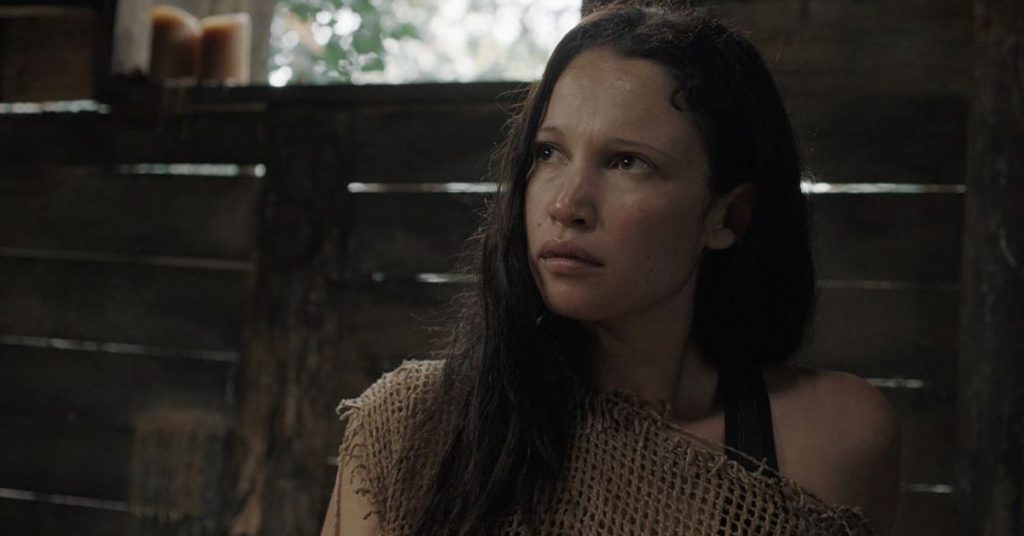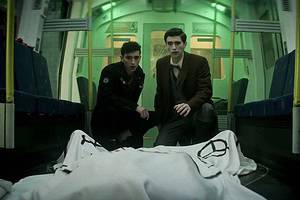Synopsis:
On a surveillance mission in a primordial forest, a park ranger encounters two survivalists following a post-apocalyptic lifestyle. The boy and his philosophical father seem to have their own religion, and a mysterious relationship to nature. There are many suspicious aspects to their existence, but when the cabin is attacked by strange, post-human beings one night, she learns that there is a greater threat in this emergent wilderness.
There’s something about the woods that feels inherently unknowable. They’re dense and endless. Anything could be living inside them – be it normal creatures or something otherworldly. There’s a reason so many horror films take advantage of forest settings. Nothing is scarier than the unknown, and the woods are often an unknown.
Gaia, a new film written by Tertius Kapp and directed by Jaco Bouwer takes advantage of this inherent creepiness. While the movie often feels like more of a dark fantasy film than an eco-horror one, there’s still a fair amount of wildly creative creature design and deeply unsettling body horror. Unfortunately, the film’s narrative and characters aren’t as compelling as its visuals are.

The Story
On the surface, Gaia plays out like many an eco-horror film before it. A forest ranger, Gabi (Monique Rockman), injures herself on a routine investigation, losing contact with her partner. Two survivalists – Barend (Carel Nel) and his son, Stefan (Alex van Dyk) – quickly take her in. However, Barend and Stefan seem to be at the center of something strange. Something involving mysterious semi-fungal creatures and, potentially, Mother Nature herself. What follows is a tense, claustrophobic affair as Gabi pieces together what’s going on in this forest and how she can leave.
At first, things start promisingly. It doesn’t take long for Gabi to find Barend and Stefan, nor for the fungal creatures to make their first, frightening appearance. Unfortunately, the movie proceeds to grind to a near-halt and never manages to pick up steam. Instead, it spends buckets of time exploring a metaphor that’s never satisfyingly paid off and feels a bit cliche. Without going into spoilers, it’s a big idea that’s seen in many eco-horror films: Mother Nature’s pissed off with humanity. But this time, it’s tangled up with a fairy familiar Biblical tale. A neat twist, to be sure, but one that’s not explored as fully as you’d like.
The film unabashedly embraces its abstract tendencies – both to its credit and discredit. It’s always worth praising a film not holding the audience’s hand and spoonfeeding them every little piece of information. But for me, Gaia swings too far in the other direction and fails to make its narrative fully coherent. It’s one of those movies that asks a lot of questions without answering most of them. You’ll spend the majority of the film confused about what’s going on, but assuming everything will come together by the ending. And it almost does. Until it doesn’t.
Characters
My biggest problem with Gaia is its characters. Having watched the film, I have no idea whose story it is. You’d think it would be Gabi’s. She’s the first character we see, and she’s who we spend the most time with. But we know very little about her as the film begins, and we know about the same when it ends. Mostly, she just feels like a character the plot is happening to, rather than an active participant. Rockman delivers an engaging performance, but she’s given little more to do than react to what’s happening to her.
An argument could be made that Gaia is Barend and Stefan’s story. A story about an overcontrolling, fanatical father and the son who’s trying to break free. And the movie does support this reading, but I feel like it doesn’t lean into it hard enough to quite sell it. Nel is extremely compelling as he plays up Barend’s fanaticism, and belief in this mysterious woodland god. And van Dyk delivers an endearingly sweet and innocent performance as Stefan connects with Gabi and searches for an escape from his father’s world. But I’m not sure the film is truly their story, either.
Instead, Gaia feels like the kind of film that’s primarily about its ideas rather than its plot or characters. For some, this will work exceedingly well. For others, it will be disappointing. I fall closer to the latter’s camp. I frequently found myself wishing the film spent more time developing its characters, making me invested in their story, and their wants and needs. But it didn’t.

Visuals and Atmosphere
However, Gaia is an undeniably good-looking film – especially with how modest its budget is. The creature design is delightfully creative, feeling both familiar and new. They’re unsettling in the best way, and I loved seeing them. While I could’ve used more body horror, what was there was creepy as hell and brilliantly executed. There were times I felt the film went a bit overboard with abstract imagery – particularly with its frequent, quick-fire flashes of growing fungus and the like. But these images do contribute greatly to the film’s unsettling atmosphere.
And speaking of the atmosphere, much praise should be given to Pierre-Henri Wicomb’s score and Tim Pringle’s sound design. The score is full of the kind of droning, ambient music found in a lot of modern horror films. But it’s still effective. Especially when combined with the film’s masterful sound effects. I mean, every time the fungal creatures appear, they’re accompanied by this sound cue that just makes your skin crawl. The combination of the score and sound design just adds to the film’s sense of impending doom and claustrophobia.
Gaia is a film that relies more on visual storytelling than dialogue to communicate its narrative. Whether or not it succeeds is debatable, but it does result in an unforgettable feast for the senses.
Final Thoughts
Ultimately, Gaia seems destined to be a divisive film. Do its creative and creepy visuals make up for its confusing narrative and underdeveloped characters? Does the film explore its ideas enough to make them resonate with audiences? Or do they just feel vague? Honestly, I wish more time had been spent developing the characters and plot and better exploring the film’s themes and how they tie into the rest of the story. But your mileage may vary. If you’re looking for a film with amazing visuals that’ll make you think hard about what humanity is doing to the environment, then look no further. But if you’re looking for a more traditional narrative, then this might not be your cup of tea.

Director: Jaco Bouwer
Writer: Tertius Kapp
Producers: Jaco Bouwer, Tertius Kapp, Jorrie van der Walt
Executive Producers: Jan du Plessis, Nkateko Mabaso, Karen Meiring, Yolisa Phahle, Allan Sperling, Nicola van Niekerk, Kaye Ann Williams
Rated: R
Runtime: 1h 36m
Rating: 3 out of 5







